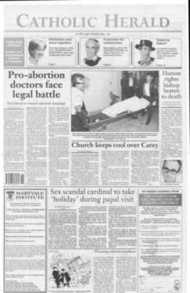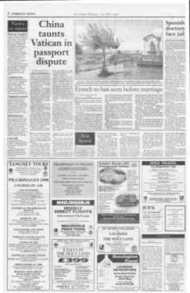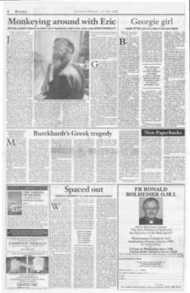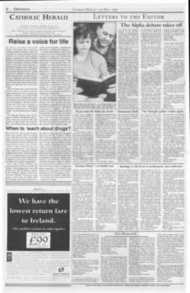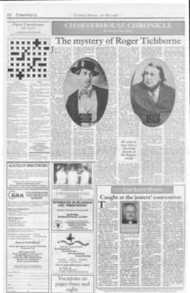Page 12, 1st May 1998
Page 12
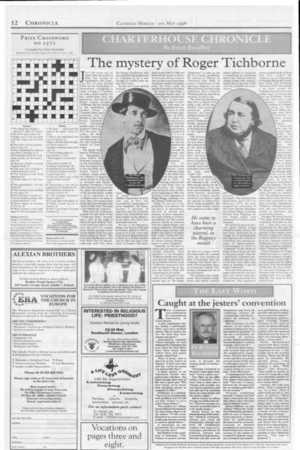
Report an error
Noticed an error on this page?If you've noticed an error in this article please click here to report it.
Tags
Share
Related articles
Of People
Obituary
The Tichborne Claimant
Tichborne Dole'
Tortured, Too
The mystery of Roger Tichborne
JUST 100 YEARS AGO, in April 1898, the body of a man was buried in Paddington Old Cemetery. For 14 years, he had lived on the borderline of i destitution, struggling to . make a living as a butcher, , his wife a music-teacher; yet his coffin-plate bore the grandiose inscription Sir 'Roger Charles Doughty Tichborne. He was known , to the authorities as Arthur Orton (or Thomas Castro) and to everyone else in Britain as The Tichborne Claimant
Five thousand people came to his pauper's funeral. For the past 32 years, he had brought turmoil and notoriety to the old Catholic family of Tichborne.
The family had been at Tichborne, in Hampshire, 'since before the Norman Conquest. At the Reformation they had stayed true to the old Faith; their family chapel is a Catholic chapel within the Church of England parish church, as is the case at Arundel and Mapledurham. During the 17th and 18th centuries, they had lived the quiet, unostentatious life of the recusant family unable to go to university or be commissioned in the army or navy, they had tended their lands and inter-married with others of their kind. The head of the family was a baronet.
What made the Tichbornes notable was the story of the "Tichborne Dole." According to this, in the reign of , Henry II, Lady 2Viabella Tichborne had bequeathed to the poor the yield of a certain piece of land, placing a curse on the family if this were not I always given to them. The I Dole was distributed on Old New Year's Day (25 March) each year until 1794, when
Sir Henry Tichborne was persuaded by his neighbours to abandon it, as it was thought to conflict with the new Poor Laws.
At once the Curse showed danger
signs of being fulfilled. A generation of seven sons (six, in fact) was succeeded by a generation of seven daughters. Sir Henry became a prisoner of Napoleon and the old family house was demolished and then rebuilt in his absence. Soon after, the Dole was discreetly restored.
An heir to the baronetcy, Roger, was born in 1829 and his brother, Alfred, in 1839. It seemed as if the curse had been averted. Roger was born in Paris to a French mother and his first ten years were Spent in France. For three years, from 1845 to 1848, he lived with the Jesuits at Stonyhurst but he did not seem to have profited much from their distinctive method of education; for four years he knocked around in the army. He seems to have been a charming wastrel, more in the Regency mould than in that of the new, respectable Victorians. Like many an unsatisfactory son, he went to seek his fortune overseas. In 1852, e sailed for Valparaiso nd lived for the next two years in various parts of South America. In 1854 he set sail for amaica; his ship was lost with all hands, and Roger was presumed drowned.
For 10 years there was silence. Lady ichborne clung to the belief that her son was alive and in 1865, on hearing a rumour that he had been seen in Australia, she began advertising for news of him. At the beginning of 1866, one Thomas Castro appeared at Wagga Wagga, claiming to be the missing Tichborne heir.
Sadly, he was not a very promising 1 lth baronet: he was gross in appearance, uncouth in speech and manner, of poor education and quite lacking in French; nevertheless, he had certain physical details in common with the original Roger, and various witnesses (including a faithful negro servant, Old Bogle) were able to recognise him. Lady Tichborne was anxious to receive him, and he set about making arrangements to come to England.
Naturally, he fell prey to sharps and speculators, and, equally naturally, other members of the Doughty Tichbome family were sceptical and felt threatened by the possibility of fraud. Lady Tichborne welcomed him and recognised him as her son. She died in 1868, still unwavering in her belief.
On the strength of his claim he was able to borrow money and, as "Sir Roger
Tichborne," to take up the life of a country gentleman. He arrived at Tilbury on Christmas Day 1866, in scenes reminiscent of the opening chapters of Our Mutual Friend, just then being published. But to recover Tichborne House and all the property, he had to sue.
The civil case lasted from May 1871 to March 1872 (with a day off for the Derby!) and excited enormous public interest not least perhaps because the Claimant had issued "Tichborne Bonds," repayable only in the event of his restoration to his rightful estate.
The division of public opinion was akin to that whipped up by the tabloid press today: Tshirts had not been invented, but every other device of publicity was deployed. A popular music-hall comedian even took the stage name "Little Tich."
Generally speaking, the 'have-nots' were on the Claimant's side -with little enough reason, for the re-instatement of yet one more hard-drinking, spendthrift baronet, interested chiefly in country sports, would do very little to assist the spread of democracy. More understandably, the landed and middle classes were suspicious of this vulgar _ ian who was trying to break into their ranks. In a strange twist, the case became an issue of no-popery since the Claimant had lapsed into a kind of Protestantism; fanatics accused the Catholic Tichbornes of keeping him out of his inheritance.
The evidence was complicated. School friends, neighbours and family servants risked ridicule or ostracism in identifying the shambling hulk of the Claimant with the slender Roger they remenabered. But at the end of the case the plaintiff was nonsuited, and arrested for perjury. The criminal trial lasted from April 1873 to February 1874; the jury accepted the contention of the Crown that the defendant was Arthur Orton, a missing butcher from Wapping; he was found guilty and sentenced to 14 years' penal servitude.
He served 10 years in various gaols before being released on ticket-of-leave. He had been defended by a strange set of mountebanks and chancers, who carried on defending him during his years of imprisonment. Unfortunately in 1895 he "confessed" in the People to being Arthur Orton; for this he was paid £4,000. This was a typical piece of ghosted journalism and by that time there would have been little cash value in asserting "I am Sir Roger Tichborne".
From this brief summary, it might seem that the case was done and dusted long ago. The claimant was Orton, not Tichborne. This conclusion
is not accepted by all of those who have studied the evidence, set out exhaustively in Douglas Woodruff's excellent book The Tichborne Claimant (1957), For myself, I am fairly certain the Claimant was not Orton but neither am I convinced that he was Tichborne. (At the time there was a man named Cresswell, confined in a lunatic asylum in New South Wales who may have been Tichborne or Orton or even the genuine Castro.) I have one last clue. In recent years, sadly, the male line of Tichbornes has failed
and the baronetcy is extinct the superstitious might say that the Curse has at last taken effect. A friend of mine knew the last baronet, Sir Anthony, quite well, and he tells me that in his later years, he bore an uncanny resemblance to the Claimant. "Do you think that the Claimant was Sir Roger?" I asked. After some thought he replied, "No." But perhaps this resemblance gives some colour to a story that circulated at the time of another, illegitimate, Tichborne of Roger's generation, who encountered his cousin in Australia and assumed his identity.
Douglas Woodruff wrote: "The great doubt still hangs suspended. Probably for ever now..." But this need not necessarily be the case. If DNA testing can establish the identity of the corpses of the Russian Imperial family, could not DNA be recovered from the Claimant's grave in Paddington and compared with that of known members of the Tichborne family?
If the Claimant was Roger Tichborne, this is a story of monstrous injustice, of rightful inheritance denied and of a man imprisoned for telling the truth. If he was not Roger Tichborne, he was a heartless deceiver, battening on a bereaved lady in the hope of stealing what was not rightfully his. The truth can hurt nobody now.
blog comments powered by Disqus


